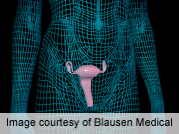
THURSDAY, Oct. 4 (HealthDay News) — Researchers who discovered genetic risk factors linked to uterine fibroids in white women say their findings will lead to new screening and treatment methods for the condition.
Uterine fibroids are the most common type of pelvic tumor in women — they occur in 75 percent of women of reproductive age — and the leading cause of hysterectomy in the United States. Uterine fibroids can lead to abnormal vaginal bleeding, infertility, pelvic pain and pregnancy complications.
Researchers at Brigham and Women’s Hospital in Boston analyzed genetic data from more than 7,000 white women and identified variations in three genes that are significantly associated with uterine fibroids.
One of these variations occurred in a gene called FASN, which encodes a protein called FAS (fatty acid synthase). Further investigation showed that FAS protein production was three times higher in uterine fibroid samples compared to normal tissue, according to the report published online Oct. 4 in the American Journal of Human Genetics.
Overproduction of FAS protein occurs in various types of tumors and is believed to be important for tumor cell survival, the study authors pointed out in a hospital news release.
“Our discovery foretells a path to personalized medicine for women who have a genetic basis for development of uterine fibroids,” senior study author Cynthia Morton, director of the Center for Uterine Fibroids, said in the news release. “Identification of genetic risk factors may provide valuable insight into medical management,” she concluded.
More information
The U.S. National Institute of Child Health and Human Development has more about uterine fibroids.

